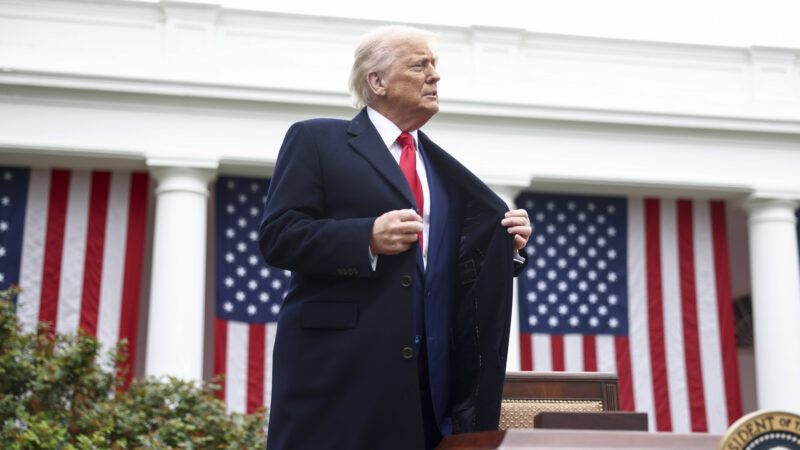Trump's Tariffs Usurp the Legislature's Tax Power
The president’s sweeping import levies have no basis in the statute he cites.

Watching the stock market fluctuate wildly in response to President Donald Trump's constantly changing tariff plans, you might wonder why the Framers would have given a single man so much authority over the U.S. economy. The short answer: They never did, and neither did Congress.
The Constitution vests Congress, not the president, with the power to "lay and collect taxes, duties, imposts and excises." Yet Trump has announced a dizzying array of "duties," including punitive tariffs on Mexican and Canadian goods, a 25 percent tax on imported cars and car parts, tariffs on Chinese goods as high as 145 percent, and a 10 percent general tax on imports that may rise further based on supposedly "reciprocal" rates that make no sense.
These levies amount to the largest tax hike since 1993 and raise tariffs more than the notorious Smoot-Hawley Act of 1930, which deepened the Great Depression by setting off a trade war. The main authority that Trump cites for these far-reaching, commerce-disrupting, price-boosting tariffs is the International Emergency Economic Powers Act (IEEPA), a 1977 law that says nothing about tariffs.
The IEEPA—which was designed to constrain, not expand, the president's powers—authorizes economic sanctions in response to "any unusual and extraordinary threat" to "the national security, foreign policy, or economy of the United States" after the president "declares a national emergency." Although the law has been on the books for nearly half a century, no president until Trump has ever invoked it to impose a general tariff.
There are good reasons for that. The IEEPA mentions restrictions on transactions involving foreign-owned assets, but it never refers to taxes, tariffs, or any of their synonyms.
The statute "enables the executive branch, in a foreign policy crisis, to block transactions, freeze assets, and seize or sequester foreign property," notes a brief supporting a lawsuit that the Liberty Justice Center filed on April 14—one of several legal challenges to Trump's tariffs. The authors, who include legal scholars such as Federalist Society co-founder Steven Calabresi and three former federal judges widely respected among conservatives, add that "all the permitted presidential actions have their effects abroad," meaning Congress "did not authorize the President to tax or regulate the domestic activities or property of Americans."
If Congress "had intended to delegate the power of taxing ordinary commerce, it surely would have said so," the brief says. Other statutes explicitly authorize tariffs in specified circumstances, prescribing lengthy procedures for imposing them.
The shortcut that Trump chose is inconsistent with the IEEPA in another crucial way. To justify his tariffs, he has cited two supposed "emergencies": the influx of illicit fentanyl, which goes back a decade or more, and ongoing bilateral trade deficits, which Trump himself has been decrying since the 1980s.
Neither of those constitutes the sort of "unusual and extraordinary threat" that Congress contemplated. "A statute grounded in emergency cannot be stretched to support open-ended policymaking," Calabresi et al. say, "especially where the alleged threat is neither imminent nor novel."
Trump's interpretation of the IEEPA amounts to an assault on the separation of powers. "If decades-old trade deficits now qualify as an 'emergency,'" Calabresi et al. warn, "then any President could invoke IEEPA at will to bypass Congress on matters of taxation, commerce, and industrial policy."
That result, the brief argues, violates the "major questions" doctrine, which says any assertion of executive power involving matters of "vast political and economic consequence" must be based on "unmistakable legislative authority." It also violates the "nondelegation" doctrine, which says Congress cannot surrender its legislative powers.
Recent lawsuits by the New Civil Liberties Alliance and the Pacific Legal Foundation—organizations that no one would mistake for left-wing outfits bent on undermining Trump's agenda at every turn—make the same basic points. "This dispute is not about the wisdom of tariffs or the politics of trade," Calabresi et al. write. "It is about who holds the power to tax the American people."
© Copyright 2025 by Creators Syndicate Inc.
